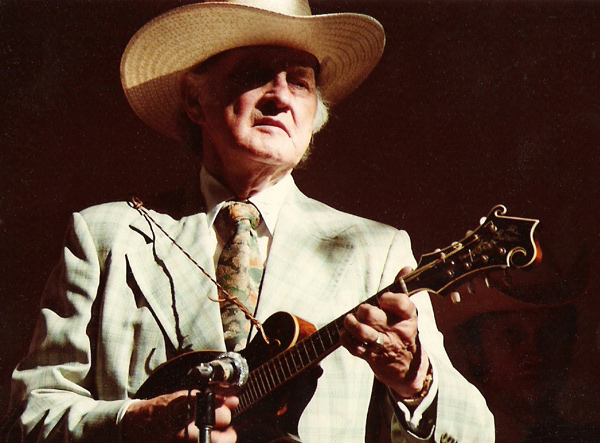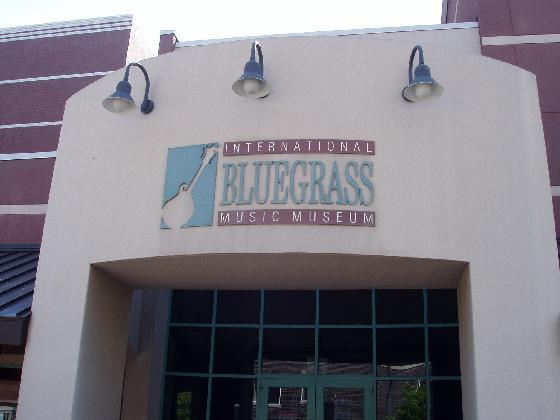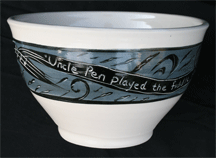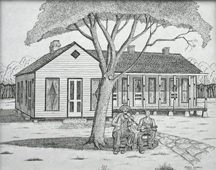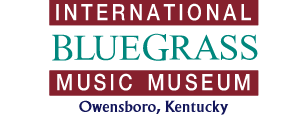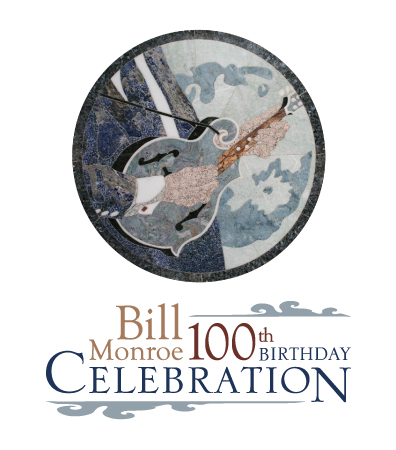A Bill Monroe Centennial Moment
Play Ball!
In the late ‘40s, as a way of ‘resting his mind from music,’ Bill Monroe assembled and funded two baseball teams--one that traveled with him on the road, one based in Nashville. It was the Father of Bluegrass’s way of keeping baseball from interfering with his music--by taking it with him--but it made life hectic for his musicians. ‘He liked to kill me playing ball,’ Don Reno said. But to Bill, bluegrass, like baseball, was a way for a man to test himself against other men. Bluegrass, like baseball, was competition.
(Ed. Note: Had he lived, Bill Monroe, the Father of Bluegrass, would be 100 years old on September 13. Mr. Bill is such a giant of American music that TheBluegrassSpecial.com is honoring his centennial year with a Bill Monroe Centennial Moment each month throughout 2011. Sometimes these will take the form of accounts of Monroe's influence on succeeding generations of musicians--as in February’s installment of how young Carl Perkins's discovery of Bill Monroe's music helped him develop the rockabilly rhythm he perfected in the honky tonks around Jackson, TN; other installments will focus on a turning point or a key juncture in the man’s life, or, as is the case this month, simply a telling aspect of Monroe’s personality, in this case his fascination with baseball as a game in which men could test themselves against each other much as they do in bluegrass. The music and the game, you see, were competitive endeavors to Mr. Bill.)
As his popularity grew in the 1940s, and the pace of his touring accelerated, Bill Monroe found his own unique way to deal with the constant professional pressure he was under. As James Rooney reported in his book Bossmen: Bill Monroe & Muddy Waters:
Despite his breakneck pace, Bill began to find time to indulge his other interests. He had bought a farm outside of Nashville and began to raise Tennessee walking horses. They were beautiful animals, and he had a keen appreciation of their style and poise. Many other stars of the day in Nashville also raised horses, but they seemed to be imitating a Hollywood notion of cowboy life. Bill tempered the cowboy with his Kentuckian’s sense of good horsemanship and breeding.
Another interest that Bill brought with him from Kentucky was game chickens. He and (his brother) Birch raised them, and whenever they had a chance they would put them up against all comers. It’s an ancient and bloody sport that has lost its respectability in modern times, but Bill always liked to watch a particularly game chicken overcome a bigger opponent. Aside from the gambling part, the sport said something to him about heart and determination that he could relate to his own struggle to be the best.
‘An American original, an American treasure’: Marty Stuart joins Bill Monroe & The Blue Grass Boys for ‘Southern Flavor’ on the American Music Shop. Bill takes care of business on mandolin.Bill’s most consuming preoccupation at this time was baseball. He decided that the only way to keep baseball from interfering with his music was to bring it along with him wherever he went.
“I’d have liked to be a baseball player,” Bill said. “I love baseball. But you have to have good eyes to play baseball and my eyes never was good. I could hit good and could’ve been a fair player.
“In the late forties I had two ballclubs--one that traveled and one that worked out of Nashville. They were good ballclubs. Had college boys and ballplayers I picked up out of Nashville. The road club was called “The Bluegrass All-Stars,” and the one out of Nashville was called “The Bluegrass Ballclub.” I paid each man ten dollars a day and five or ten dollars if they hit a home run. And later on I paid the pitchers twenty or thirty dollars a day--if he was a good pitcher. Back when Happy Chandler was Commissioner there was plenty of ballclubs through the country and they was all working hard to get as far in it as they could get.. And wasn’t no trouble to get a game in any city. The club I had on the road I don’t think was beat but only a couple or three times all season. They was really a wonderful club. There was a couple of teams in Kentucky and West Virginia that beat ‘em. And the umpire beat ‘em one place in Kentucky and one place in West Virginia. You know, you can’t beat an umpire. The clubs I had, you know, there was a lot of betting going on, you know. Some of the boys they’d bet--I didn’t know it ‘til later--that we’d score in the first inning. I had a man that could get on base and I had another feller that could advance him, you know. If he could get him as far as third, he could steal home. He stole home many a time.
“Stringbean played on the club on the road. He could play nearly any position. Then we had Jackie Phelps. He was a good shortstop and in the run of a season he’d only struck out three times. You couldn’t hardly get him out. Then we had G.W. Wilkerson, he was a good singer. So we had some pretty good musicians in the club.
Bill Monroe & The Blue Grass Boys, ‘With Body and Soul,’ live at the Grand Ole Opry“Back in them days, if you was on the Grand Ole Opry you was rated pretty high, you know. Or if you worked for some group that was well known. So on the road we had the Shenandoah Valley Trio--they recorded some. Joel Price and G.W. Wilkerson was in it. Maybe Jimmy Martin sung tenor in that trio on some stuff. And Jackie Phelps was in it. We had two or three men to back them up.
“When we came to town the ballclub would get out early and practice up until about seven-thirty and then the show would go on and it would go on for about half an hour before the game would start. And the game would start at eight o’clock.
“We had some good names in our ballclub. We had Jim Kirby who played for the Cubs--he played center field for us. And we had a fellow by the name of Mac Faron who played for the Cotton Belt in Arkansas. And a catcher named Allen who caught for Bluefield, West Virginia, in the Appalachian League. We had pitchers who were scouted by Pittsburgh and the St. Louis Cardinals. I know we played Mr. Sterling, Kentucky, and this pitcher that we had struck out sixteen in a row. He was mowing ‘em down. We taken on the best team in the eastern part of Kentucky, which was Pikeville. We played seven innings and it was five and two in our favor.
“Money was plentiful right in that spot and I remember there was eleven fifty-dollar bills that come into the show that night. ‘Course there was a lot of silver dollars and two-dollar bills in that part of the country.
“We played about six games a week. Saturdays I would have to go into Nashville to play the Opry. Bit if the Shenadoah Valley Trio was out and there was enough show, then they would go right ahead and play seven days a week. Wasn’t no trouble to get plenty of bookings. We taken the club through the Carolinas, Kentucky, West Virginia, Virginia, Louisiana, Mississippi, Missouri, Illinois. You made a lot of money. ‘Course it lost a lot of money. I carried thirteen or fourteen players at ten dollars a man, besides the musicians. But you could play any little town. I worked a season, and the smallest crowd I had was four hundred and eighty dollars. It run from there on up to three thousand dollars a night--up in that bracket. I would average between fourteen and eighteen hundred dollars a night. If it was two or three hundred, I never would even count the money if it was that low--just carry on to the next town.
For those working will Bill then, like Don Reno, it was an exhilarating, if exhausting, time.
“At this time Bill was making a lot of money,” Reno said. “We worked every day almost and he drew big crowds. He came out with the first songbook. The first order was a boxcar full of books. We went down to the depot and hauled them out to his barn and in no time they were gone. We did an hour show on WSM at night and by mail he sold almost al of them.
“‘Course he had the tent show in the summer. We couldn’t keep a crew together, and me and Joel Price and Bill put the tent up and took it down more than anybody else did. Bill loved to work. Nobody could work him down.
“Traveling with that thing was out of this world. We had a forty-six Packard limousine and some of us rode in that limousine with our instruments and suitcases on top and in the trunk. Me and Joel Price did most of the driving. I’d drive to keep my legs stretched out.
Bill Monroe & The Blue Grass Boys, ‘Rose Of Old Kentucky’“Bill was more interested in bail than he was music at this time. I reckon this was a way of resting his mind from music. But he liked to kill me playing ball. We would work a show one night and drive to the next town and usually get in at an early morning hour and he’d have a ball game set up by ten o’clock with the local team.”
The mixture of bluegrass and baseball was no stunt in Bill’s eyes. He didn’t see it that way. To him music was a form of competition just like sports. It was a good way for a man to prove himself against other men. It was healthy. It kept you in shape and alert. His philosophy of life was embodied in everything he did, whether it was raising horses, fighting chickens, playing ball, or making music.
“All the way through,” Bill said, “bluegrass is competition with each man trying to play the best he can, be on his toes. You’ll find it in every group. You’ll find it in one group and another group following him. It works that way. They’ll still be friends, but they’ll work hard to be better than the other.”
***
Art Inspired by Bill Monroe On Exhibit and For Sale at International Bluegrass Museum
At the International Bluegrasss Museum in Owensboro, KY, now through September 15, is a display of art inspired by Bill Monroe’s music, sponsored by an Arts Build Communities grant through the Kentucky Arts Council
This Exhibit is the result of an invitation to visual artists to share their interpretation of a Bill Monroe song. Bill Monroe often painted images with his music and in this Exhibit artists have depicted their versions of these same images visually. Thirty-five artists responded to the invitation, with over sixty entries. The entries encompass many styles, from fine art to folk art. This is representative of the wide variety of people to whom Bill Monroe's music appeals.
Uncle Pen by Michelle Hartung, Owensboro, KY. Inspired by ‘Uncle Pen.’ Ceramic bowl. 8.5”x5.25”. $40.Most of the works of art submitted were inspired by the lyrics of a Bill Monroe song, while some were inspired by instrumentals; some were inspired by songs Monroe wrote, others by songs from other sources that Monroe covered and stamped as uniquely his.
Bill Monroe and Uncle Pen by James E. Goodall, Utica, KY. Inspired by ‘Memories of Mother and Dad.’ Pen and ink on illustration board. 24”x30”. $250.The pieces of art selected for the Exhibit are listed in this catalog in alphabetical order by artist. All the art on display in the Exhibit is available for purchase at the prices listed. Sixty percent of the proceeds will go to the artist and forty percent will go to the Museum. If you are interested in purchasing any of the artwork please contact Forrest Roberts at forrest@bluegrassmuseum.org.
For more information on the Bill Monroe Centennial celebration festivities at the International Bluegrass Museum, visit the Museum website, and please make a donation to support its worthy effort to document the history and evolution of bluegrass and to promote the music to new generations.
Founder/Publisher/Editor: David McGee
Contributing Editors: Billy Altman, Laura Fissinger, Christopher Hill, Derk Richardson
Logo Design: John Mendelsohn (www.johnmendelsohn.com)
Website Design: Kieran McGee (www.kieranmcgee.com)
Staff Photographers: Audrey Harrod (Louisville, KY; www.flickr.com/audreyharrod), Alicia Zappier (New York)
E-mail: thebluegrassspecial@gmail.com
Mailing Address: David McGee, 201 W. 85 St.—5B, New York, NY 10024


